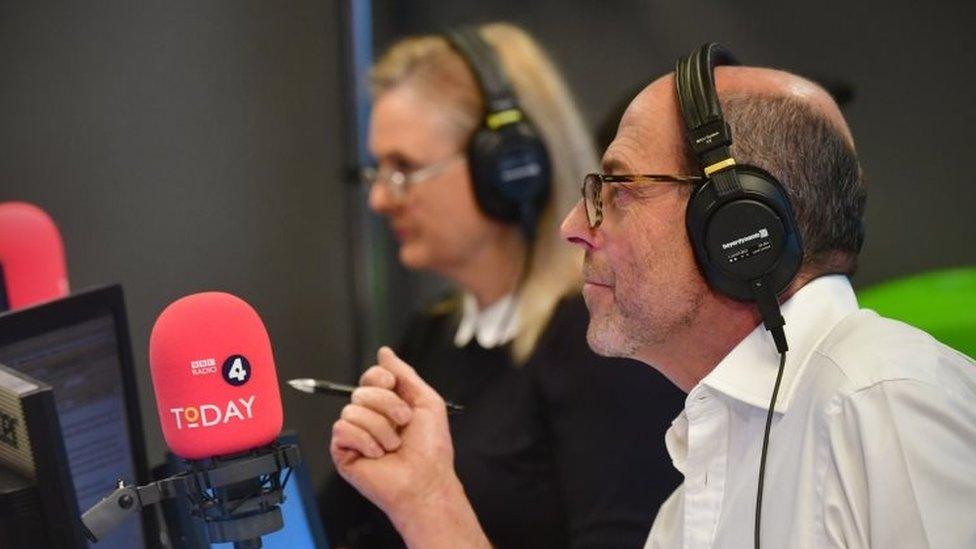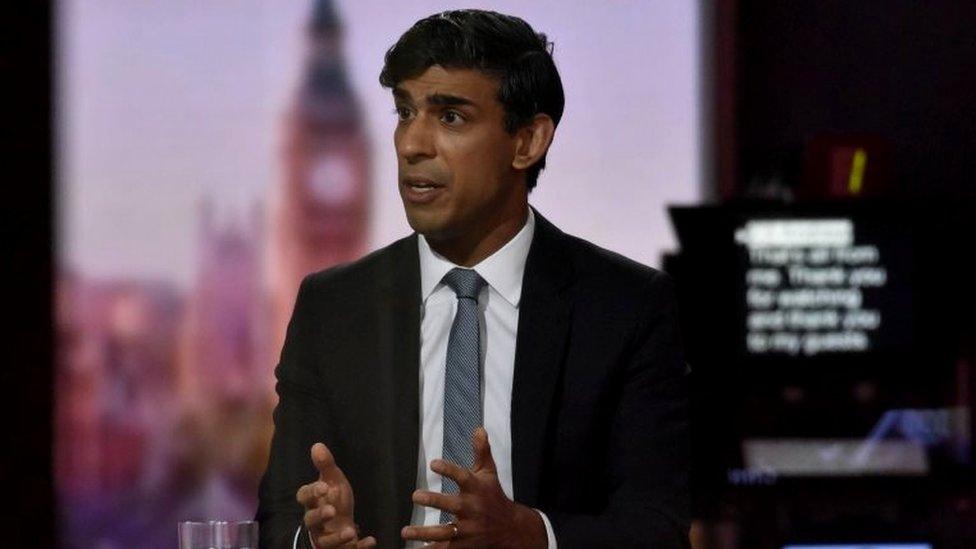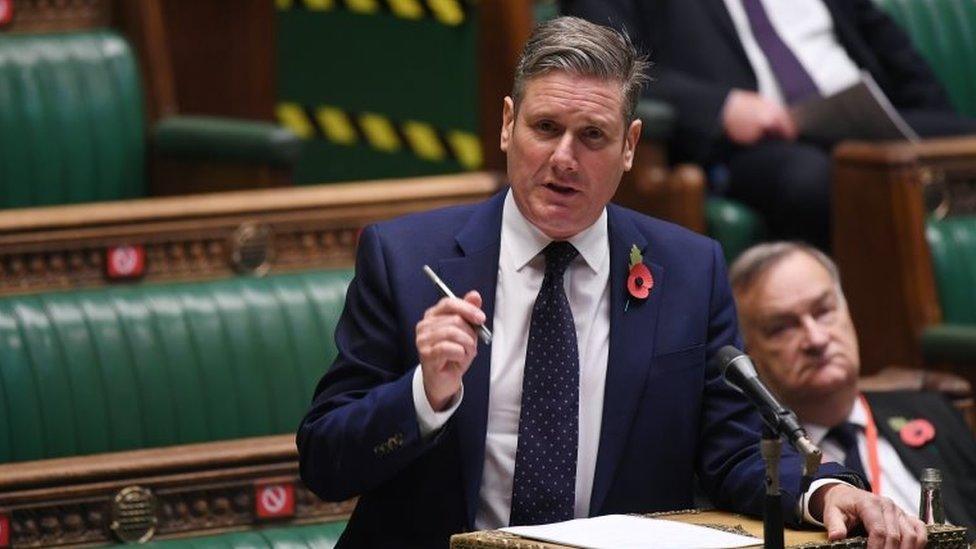Nick Robinson: Let's give politicians a chance to speak human
- Published

I've slammed. I've raged. I've snapped, scolded, exploded, erupted and lost it.
That, at least, is how one national newspaper has described the clips of my interviews that it has chopped up, parcelled and packaged as tasty morsels for readers of its website, who they appear to believe have an insatiable appetite for punch-ups between politicians and interviewers. If they're right and that's what people want, I despair.
I've been lucky enough to travel the world as political editor for both ITV and BBC News, posing questions to presidents and prime ministers.
I took pride in asking the tough questions I thought people watching and listening at home would ask if only they had the chance. Questions that journalists in other countries seemed afraid to ask.
In the Great Hall of the People in Beijing, I asked the Chinese premier when the people would get the chance to vote for their own leaders.
In the White House, I asked George W Bush whether he was in denial about the aftermath of the invasion of Iraq. It led news bulletins in the United States and would later lead the President to tell me, memorably, to "cover your bald head" when I was mopping sweat off my brow on the lawn of Camp David.
'Gotcha moment'
Now, I make my living asking questions on Radio 4 on Political Thinking - which starts a new series this week - and on Today, the country's oldest breakfast programme.
I see a danger that we interviewers all too often see the "Gotcha" moment as the test of whether we've done our jobs properly.
Never mind the interview, have you seen how many shares and likes I got on Twitter or Facebook?

Rishi Sunak was able to speak more candidly on the podcast
The macho operatives who once ruled over Downing Street responded by boycotting interviewers and shows that, they claimed, didn't give them a fair hearing. They concluded that a video clip on social media, which they recorded and controlled, played better than those in which their guy was shown to be on the back foot.
We've seen where all this can end.
Interviews that never took place are remembered more than those that actually did.
'Accountability interview'
Ministers trusted to say nothing beyond the brief are sent by party HQ to zoom from one studio to the next facing questions about issues they often have no responsibility for - and precious little knowledge of save for the crib sheets I can occasionally hear rustling.
One cabinet minister, who'd forgotten they could be seen as well as heard, read word-for-word from multiple sheets of carefully-typed notes marked with a pink highlighter.
Surely we can all - interviewers, politicians and, yes, you who watch or listen to our exchanges - can do better than this?
Despite the explosion of social media, political interviews remain for millions the way they understand the decisions that are being made in their name and the place they can see and hear arguments made and tested. What's more, they should be an opportunity to open a window on what is shaping the thinking of those in power.
What newspapers like to call "a grilling" - or what we at the Today programme call an "accountability interview" - continues to play a vital role in our democracy.
This week I interviewed the chancellor, Rishi Sunak, and was praised by some for my "polite persistence", while criticised by others for my "dismal interviewing". 'Twas ever thus.
This, though, is far from the only way we should conduct our national conversation.
Focus groups
During the pandemic we've heard virologists, epidemiologists and scientific modellers asked to explain the thinking that is shaping their response to the spread of the virus.
Why can't we speak to those who are developing policy on unemployment or climate change or racial inequality in the same way?
Would today's politicians dare think out loud about their thinking, about what they don't know or haven't yet decided?
Or will they always seek refuge in soundbites that have been pre-tested on focus groups?

Keir Starmer was a Political Thinking guest before becoming Labour leader
Will we in the media allow them to think aloud without seizing on every hesitation or apparent contradiction with what someone else in their party said months earlier?
Can we, in short, reduce the fear politicians feel about saying what they really think?
While we're at it, why don't we spend more time focusing on what really makes those we see and hear spouting the party line tick - their upbringing, their experiences, their values.
Passion and belief
That's what I try to do on Political Thinking. It's a half hour conversation not an interrogation.
I interviewed Rishi Sunak long before he moved into No 11.
We talked about his experience working in his mum's pharmacy as well as a hedge fund in the City: about his experience of racism and what it felt like to suffer racial slurs; and about his love of Star Wars.
I learned more about him than I have in any interview since.
Long before he became Labour leader, Sir Keir Starmer told me about nursing his sick mother, the donkeys in his garden and the time he was so focused on his work that he didn't notice his TV being nicked from under his nose.
Northern Ireland's First Minister Arlene Foster recalled seeing her father moments after he'd been shot by the IRA and how she avoided serious injury when a bomb exploded under school bus only because she had swapped seats with another girl.
I've heard stories of hardship, loss and pain as well as privilege and entitlement.
I've heard passion and belief rather than rehearsed soundbites. What really pleases me about the series, though, is the number of times people say to me: "I really hated Mr X or Ms Y but now I can see where they're coming from. I understand them".
Contrary to popular belief, politicians are only human like the rest of us, though many have forgotten how to speak to the rest of us like humans.
It's too easy to blame them for speaking like political robots.
We need to give them the chance to show who they really are and what they really think but they - and the people who advise them - need to give us the chance to ask tough questions and to hear them at least try to answer them.
The new series of Political Thinking begins on Radio 4 on Saturday at 17:30 GMT. It, and previous episodes, can be downloaded from BBC Sounds